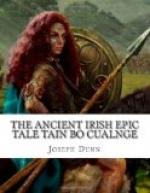[1-1] Stowe.
[2-2] Stowe and H. 1. 13.
[3-3] Stowe and H. 1. 13.
[4-4] Stowe and Add.
[a] That is, from the supreme king of Ireland.
[5-5] Stowe and Add.
[6-6] Stowe and Add.
[1-1] Stowe and, similarly Add.
[a] A short sentence in LL.,
which is probably corrupt, is omitted
here.
[b] Literally, “A man behind (in) the shadow of another.”
[c] Instead of a ring, which would be given to the bride.
[2-2] Add. and H. 1. 13.
[d] For a detailed explanation of this entire passage see H. Zimmer, in the Sitzungsberichte der Koeninglich Preussischen Akademie der Wissenschaften, 16 Februar, 1911. philosophisch historischen Classe, Seite 217.
“Nay, not such was my state,” said Ailill; “but two brothers had I; one of them over Temair, the other over Leinster; namely, Finn, over Leinster, and Carbre, over Temair. I left the kingship to them because they were [W.52.] older but not superior to me in largess and bounty. Nor heard I of province in Erin under woman’s keeping but this province alone. And for this I came and assumed the kingship here as my mother’s successor; for Mata of Muresc, daughter of Magach [1]of Connacht,[1] was my mother. And who could there be for me to have as my queen better than thyself, being, as thou wert, daughter of the High King of Erin?” “Yet so it is,” pursued Medb, “my fortune is greater than thine.” “I marvel at that,” Ailill made answer, “for there is none that hath greater treasures and riches and wealth than I: yea, to my knowledge there is not.”




